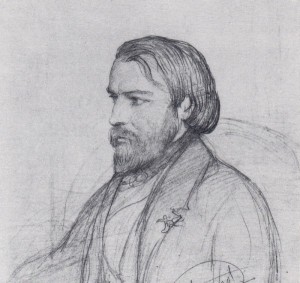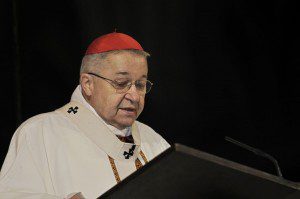The international website CGI news writes “For the occasion of the Bicentenary’s festivities, a solemn mass was celebrated at Notre-Dame on April, sunday 21 th, by Andre Vingt-trois….Here is an excerpt of his Homily.
Brothers and Sisters,
(…)
 During the 19th century, marked by the spiritual misery of believers, and the indifference or hostility of educated people (kind of enlightened Voltairians!), the miraculous resurgence of our Church in France was due to obscure priests such as the Curé d’Ars, Jean Vianney, or Père Antoine Chevrier in Lyon, on religious sisters entirely devoted to the service of the poor, such as Blessed Rosalie Rendu in Paris, in the Mouffetard district, laypeople, motivated and encouraged by evangelisation projects, such as Frédéric Ozanam. In all their various situations and with their special gifts, this generation of Christians, the “home missionary generation”, engaged in two ways, each vital to the other: proclaiming the message of truth, and serving the poor. In this way, they fought against the two scourges of that afflicted the poor, both the rural workers and the new proletariat of the cities: ignorance and misery.
During the 19th century, marked by the spiritual misery of believers, and the indifference or hostility of educated people (kind of enlightened Voltairians!), the miraculous resurgence of our Church in France was due to obscure priests such as the Curé d’Ars, Jean Vianney, or Père Antoine Chevrier in Lyon, on religious sisters entirely devoted to the service of the poor, such as Blessed Rosalie Rendu in Paris, in the Mouffetard district, laypeople, motivated and encouraged by evangelisation projects, such as Frédéric Ozanam. In all their various situations and with their special gifts, this generation of Christians, the “home missionary generation”, engaged in two ways, each vital to the other: proclaiming the message of truth, and serving the poor. In this way, they fought against the two scourges of that afflicted the poor, both the rural workers and the new proletariat of the cities: ignorance and misery.
As a young graduate, Frédéric Ozanam took up his post and its responsibilities but subsequently did not hesitate to quit the security of his profession to follow a career as aresearcher. As a teacher at the Sorbonne, he ensured that the path of his historical research would also allow him to write a work of apologetics: showing that Christianity has been a cause of great progress in the development of societies. He did not see himself as a researcher and a teacher, “despite being a believer”, in some kind of mental schizophrenia, but rather devoted himself to research and teaching “because of being a believer”. He took part in the major educational movement which formed around a number of Christian i
But the discussions and the Literary Conferences that grew around Emmanuel Bailly would direct his life into other paths. Trained from childhood to serve the poor, he was challenged by an opponent, and we are all familiar with the words of that angry voice: “Your Christianity is dead… where are the works that demonstrate your faith and that could make us respect and accept it?” He took these questions as a call from God, and very quickly, with a small group of friends, he began visiting the poor, taking Saint Vincent de Paul as their patron. Frédéric was then twenty years old. Little did he know, he was then halfway through his life. Gradually, the Conference developed its own rules for its work, and above all found its spiritual values.ntellectuals and university teachers; the foundation of the Lent Conferences at Notre-Dame was a historical sign of this movement. Faced with the esoteric religions which emerged as substitutes for Christianity, and the first illusory beliefs in science as a source of salvation to replace God, they did not give up the struggle. They wanted to rebuild acomprehensible faith that would resist truly intellectual attacks, and they also wanted to become gallant witnesses to the truth themselves.
After this brief snapshot of the new evangelisation in the 19th century, let us return to the present day. In many ways, our society shares and continues the process of dechristianisation in France during the 19th century. Today’s society also juxtaposes tremendous economic and technical success with ever more glaring pockets of misery. It too is ignorant of Christianity and the contribution it has made to the search for the common good. Now as then, we are called to make new evangelising efforts, built on the twin pillars of the proclamation of the truth and the service of the poor. Now as then, those with the best education, professional skills and personal development are called to share their own gifts and talents. Today we have to share our wealth, proclaim Christ, the only hope of the world; we have to give our personal service to the poor, not just from our surplus, but by the gift of ourselves in a fraternal relationship with the most humble.
We know that our society is no longer the same as that of the 19th century. Public resources for social benefits and poverty relief are much better, they deal very well with situations that were ignored 150 years ago. But despite this collective effort to relieve the problems many of us have in life, as we know there are always people on the margins of society that cannot access this communal protection, because they have no right to it, or because they don’t know how to ask for it, or because they don’t think they can receive it. In any case, they are still there, on the roadside in our towns as a sign that, despite our prosperity, misery has not been eradicated. What is more, despite the remarkable success of universal education which has become widespread since the 19th century, still at the dawn of the 21st century we know that there are ever-growing numbers of people who are illiterate, unable to read and write. Education can develop, why not for everyone? May our holy forebears: Vincent de Paul, Louise de Marillac, Rosalie Rendu and Frédéric Ozanam be models for us, and intercede for us.
Amen.
Read the full homily homily archishop Andre 23 (pdf, 61.11 Ko)
Tags: 200th anniversary, Cardinal, Frederic Ozanam, Paris, Society of St. Vincent de Paul, SVDP

